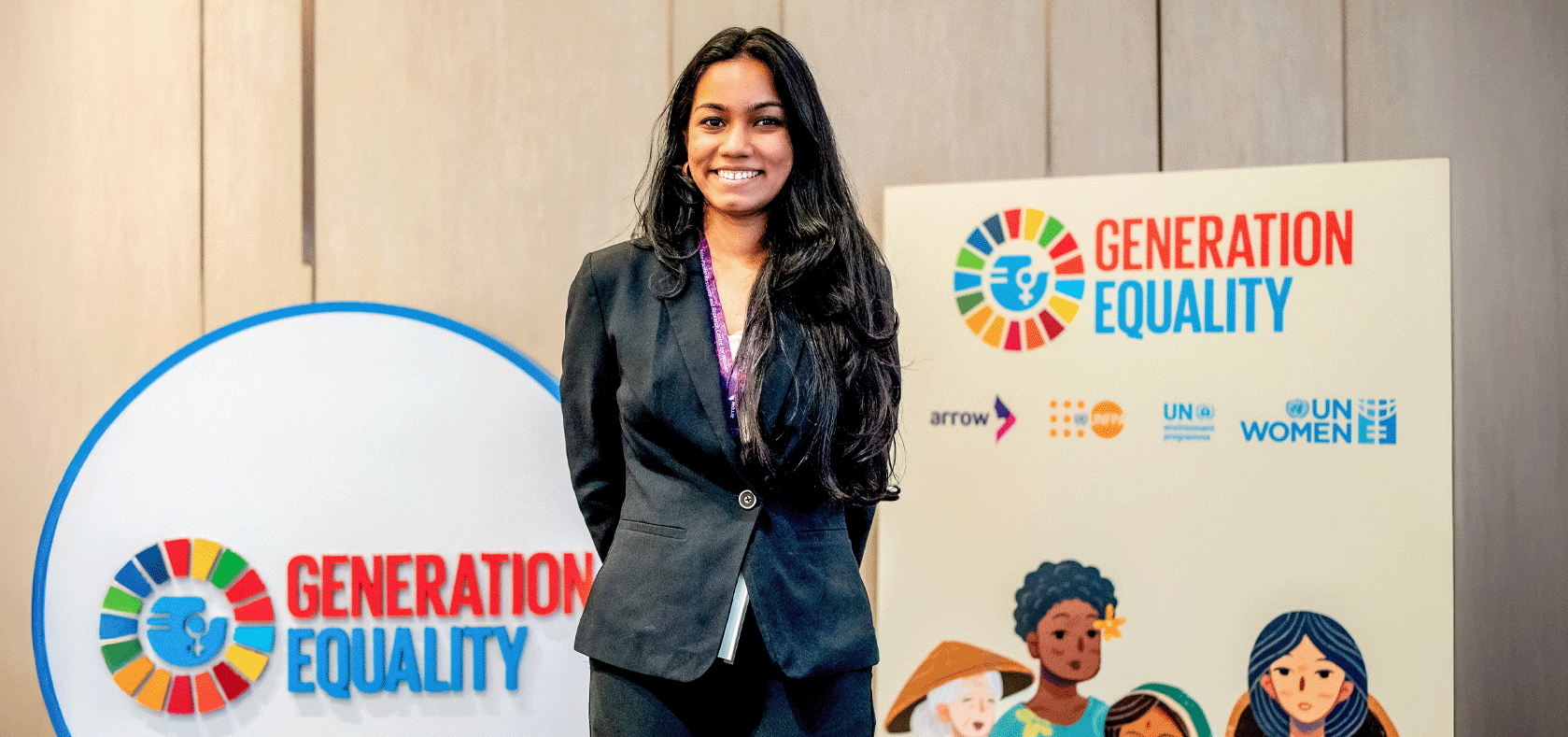Take Five: “When we address climate change, we are not just protecting the environment, we are tackling gender-based violence and building resilient communities”
Date:

Geilee Skandakumar is a member of UN Women’s 30 for 2030 Network and founder of the Gender Justice Collective, a youth-led civil society organization in Sri Lanka. Geilee is a passionate feminist advocating for gender equality, sexual and reproductive health and rights (SRHR), youth empowerment and addressing gender-based violence (GBV). She participated in the Gender Equality and Climate Action Multi-Stakeholder Dialogue co-organized by UN Women with the Asian-Pacific Resource & Research Centre for Women (ARROW), United Nations Population Fund (UNFPA), and the United Nations Environment Programme (UNEP) from 17–18 October 2024, where she shared her knowledge and perspectives on the interconnected challenges of climate change and gender-based violence.
1. What inspired you to work on gender equality and climate action?
My journey began when I witnessed first-hand how gender inequality, SRHR and GBV intersected with the impacts of climate change. In Sri Lanka’s coastal areas, I saw how rising sea levels and declining fish stocks have created economic hardship for fishing communities. This strain has led to increased frustration and, tragically, to violence within households – particularly affecting women and children. Witnessing these connections in real life inspired me to work on gender equality and climate action, as I understood that meaningful progress requires addressing these issues together. I realized that climate change is not just an environmental issue but a direct catalyst for violence. I understood that my work on GBV and SRHR cannot be separated from addressing the root causes of climate change. Consequently, I focused on a more integrated approach to gender equality and climate resilience.
2. Can you tell us more about your organization’s work on the nexus of climate change and gender-based violence?
At the Gender Justice Collective, our work centres on the intersection between climate change and GBV. Our approach includes awareness-raising, equipping women with knowledge about their rights and available resources related to sexual and reproductive health, and providing practical strategies for safety. We also work to address GBV in the context of climate impacts, encouraging community engagement and advocacy for policy change.
3. What are some of the biggest challenges that you faced in your efforts to prevent or respond to gender-based violence in the context of climate change?
While engaging in rural communities, people do not participate in awareness-raising sessions on climate change and GBV unless there are clear and immediate benefits. When they do, sustaining their interest and attention during the discussions is challenging, especially since these can be complex topics. Additionally, access to SRHR services is often limited in climate-impacted regions, increasing the risk of unplanned pregnancies, unsafe abortions and poor maternal health.
Further, as a youth-led organization, we also face constraints due to limited funding. Funding streams for climate action and GBV prevention are typically siloed, leaving little room for initiatives that tackle both. This lack of resources restricts our ability to scale up our work and reach more communities in need.
Despite these challenges, our commitment remains strong, and we continue to work towards bridging these gaps through targeted education, advocacy and strategic partnerships that reinforce the critical links between GBV and climate resilience.
4. What gaps do you think remain in tackling the issue of gender-based violence and climate change, and how can we enhance the current interventions to address these challenges?
One of our biggest challenges is the widespread lack of awareness about the interconnection between GBV and climate change. The lack of understanding about the connection leads people to see these as two distinct issues. This makes it difficult to promote holistic solutions, making education and advocacy challenging.
To tackle these issues, we need cross-sector collaborations where climate action strategies include gender-transformative measures, including engaging men and boys in changing harmful societal norms. At the community level, it is essential to implement initiatives that empower women by providing economic opportunities tailored to local contexts. Such initiatives can significantly reduce vulnerability to violence, as financial independence enables individuals, especially women, to make independent choices. Further, access to mental health support can help women and families navigate the increased stresses associated with climate impacts.
5. What support do young people need to ensure their meaningful participation in climate action and ending gender-based violence?
Access to knowledge and education is crucial. Equipping youth with an understanding of the intersections allows them to advocate effectively for integrated solutions. This knowledge empowers young people to connect the dots and drive community awareness.
Youth need genuine platforms where their voices are not only heard but valued. Involving young people in local, national and global decision-making processes is essential. This is not merely as symbolic participants but as critical stakeholders who can influence outcomes and drive meaningful change. This approach ensures that their insights and innovative ideas contribute to effective solutions.
Finally, youth-led initiatives require funding and resources. Young people have the vision and passion to create change but often lack the financial backing to scale their ideas. Providing funding and resources to youth-led projects enables young people to implement sustainable, impactful solutions.